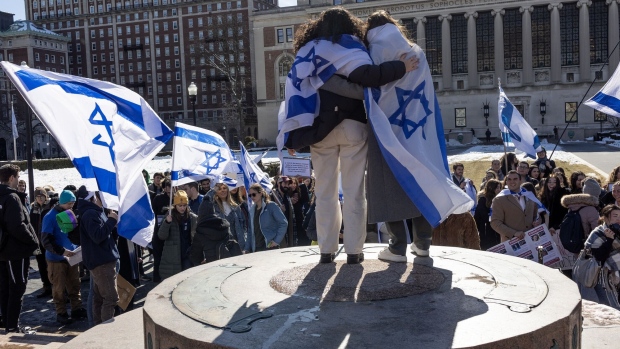Apr 21, 2024
White House Condemns Antisemitic Rhetoric on College Campuses
, Bloomberg News

(Bloomberg) -- Columbia University moved its classes online after days of anti-Israel protests roiled its New York City campus and prompted condemnation from the White House and City Hall.
The shift is an effort to “de-escalate the rancor and give us all a chance to consider next steps,” Columbia president Minouche Shafik said in a statement. “During the coming days, a working group of Deans, university administrators and faculty members will try to bring this crisis to a resolution,” including having discussions with protesters.
Shafik is coming under increased scrutiny after the university called in the police to clear a pro-Palestinian demonstration on the campus lawn. The protesters want the school to exit from any investments that “profit from Israeli apartheid, genocide, and occupation in Palestine.” But their critics allege that their actions have included antisemitic speech as well as harassment and intimidation that make Jewish students feel unsafe.
Billionaire donor Robert Kraft urged university leaders on Monday to end the protests. “I am deeply saddened at the virulent hate that continues to grow on campus,” he said in a statement. “I am no longer confident that Columbia can protect its students and staff and I am not comfortable supporting the university until corrective action is taken.” The Kraft Center, which serves as the university’s Hillel, will welcome Jewish students and faculty on campus to gather peacefully, he said.
Campuses across the US have been grappling with such protests and counter demonstrations since the Oct. 7 attack on Israel by Hamas. Since the attack, Israel has bombarded Gaza, resulting in the killing of some 34,000 Palestinians, mostly civilians, according to the Hamas-run health ministry in Gaza.
The current demonstrations at Columbia follow Shafik’s congressional testimony last week in which she defended actions she said the school was taking to protect Jewish students. Five professors had been “taken out of the classroom,” she said. A Columbia trustee who also appeared before the committee said 90 students are facing disciplinary action for their behavior.
The protesters are also calling for “amnesty for all students and faculty disciplined or fired in the movement for Palestinian liberation,” according to a statement from a group of Columbia student organizers.
A day after Shafik’s testimony, more than 100 students at the Ivy League school were arrested for trespassing. The protesters had occupied a campus lawn for more than 30 hours and were given multiple orders to disperse before arrests began, officials said.
“We have knowingly put ourselves in danger because we can no longer be complicit in Columbia funneling our tuition dollars and grant funding into companies that profit from death,” the protest organizers said.
Demonstrations have continued both on and off campus, and have fueled similar protests at other schools including Yale University and the Massachusetts Institute of Technology. At least 40 protesters were arrested by Yale police on campus Monday and are being charged with trespassing in the first degree, the Yale Daily News reported.
Columbia generally doesn’t want cops on its campus, and last week’s arrest was “an exceptional case,” according to Mike Gerber, deputy commissioner of legal matters at the NYPD. The police does not enforce the university’s internal rules, and while some students have reported having their Israeli flags taken from them, there haven’t been any reports made of physical harm against any student, officials said at a press conference on Monday.
“While every American has the right to peaceful protest, calls for violence and physical intimidation targeting Jewish students and the Jewish community are blatantly antisemitic, unconscionable, and dangerous,” White House Deputy Press Secretary Andrew Bates said. “They have absolutely no place on any college campus, or anywhere in the United States of America.”
Read More: NYPD Arrests 108 at Pro-Palestine Rally Protest at Columbia
The escalation has raised concerns among Columbia’s Jewish community, with one of the Hillel rabbis, Elie Buechler, reportedly telling a group of Jewish students ahead of Passover to return home until the campus is safer. Columbia’s Hillel issued a statement that students should remain on campus, but that the school should do more to protect them.
Columbia has about 5,000 Jewish students, representing about 23% of its undergraduates and 16% of its graduate population, according to the Anti-Defamation League.
“Heartbreak does not give the right to harass,” New York City Mayor Eric Adams said after the police made arrests last week. “We are not in a city of lawlessness.”
US Representative Elise Stefanik, a New York Republican, criticized Shafik’s leadership of the university and called for her resignation. Virginia Foxx, a North Carolina Republican, echoed Stefanik’s sentiment and said the school’s failure to restore order “constitutes a major breach of the University’s Title VI obligations, upon which federal financial assistance is contingent.”
Foxx’s letter cited multiple alleged instances of antisemitic speech, harassment and intimidation documented by videos, photographs and accounts from students.
The protest organizers pushed back on that criticism late Sunday, saying they “reject any form of hate or bigotry” and “are frustrated by media distractions focusing on inflammatory individuals who do not represent us.”
Read more: Columbia’s President Grilled Over Professors Praising Hamas
Harvard University restricted access to Harvard Yard through Friday to decrease the likelihood of disruptive protests, the school’s student newspaper reported late Sunday. The curbs include spot checks for university identifications and prohibitions on items such as tents and tables without prior approval, the Harvard Crimson reported.
Yale President Peter Salovey responded to protests on his university’s campus, saying Sunday that while Yale supports “free speech and civil discourse,” it will “pursue disciplinary actions according to its policies.”
--With assistance from Gregory Korte and Tony Czuczka.
(Adds comments from the NYPD in the 11th paragraph.)
©2024 Bloomberg L.P.


